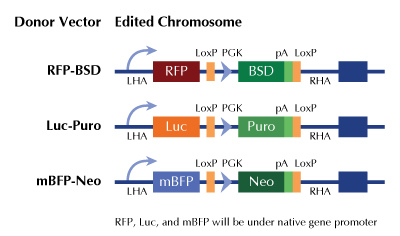BRD2 Human Gene Knockout Kit (CRISPR)
CAT#: KN220612RB
BRD2 - human gene knockout kit via CRISPR, HDR mediated
Functional Cassette: GFP-puro Luciferase-Puro mBFP-Neo
HDR-mediated knockout kit validation
USD 1,657.00
4 Weeks*
Specifications
| Product Data | |
| Format | 2 gRNA vectors, 1 RFP-BSD donor, 1 scramble control |
| Donor DNA | RFP-BSD |
| Symbol | BRD2 |
| Locus ID | 6046 |
| Components |
KN220612G1, BRD2 gRNA vector 1 in pCas-Guide CRISPR vector KN220612G2, BRD2 gRNA vector 2 in pCas-Guide CRISPR vector KN220612RBD, donor DNA containing left and right homologous arms and RFP-BSD functional cassette. GE100003, scramble sequence in pCas-Guide vector |
| Disclaimer | These products are manufactured and supplied by OriGene under license from ERS. The kit is designed based on the best knowledge of CRISPR technology. The system has been functionally validated for knocking-in the cassette downstream the native promoter. The efficiency of the knock-out varies due to the nature of the biology and the complexity of the experimental process. |
| Reference Data | |
| RefSeq | NM_001113182, NM_001199455, NM_001199456, NM_001291986, NM_005104, NR_037625 |
| UniProt ID | P25440 |
| Synonyms | D6S113E; FSH; FSRG1; NAT; RING3; RNF3 |
| Summary | This gene encodes a transcriptional regulator that belongs to the BET (bromodomains and extra terminal domain) family of proteins. This protein associates with transcription complexes and with acetylated chromatin during mitosis, and it selectively binds to the acetylated lysine-12 residue of histone H4 via its two bromodomains. The gene maps to the major histocompatability complex (MHC) class II region on chromosome 6p21.3, but sequence comparison suggests that the protein is not involved in the immune response. This gene has been implicated in juvenile myoclonic epilepsy, a common form of epilepsy that becomes apparent in adolescence. Multiple alternatively spliced variants have been described for this gene. [provided by RefSeq, Dec 2010] |
Documents
| Product Manuals |
| FAQs |
| SDS |
Resources
Other Versions
| SKU | Description | Size | Price |
|---|---|---|---|
| KN220612 | BRD2 - human gene knockout kit via CRISPR, HDR mediated |
USD 1,657.00 |
|
| KN220612BN | BRD2 - human gene knockout kit via CRISPR, HDR mediated |
USD 1,657.00 |
|
| KN220612LP | BRD2 - human gene knockout kit via CRISPR, HDR mediated |
USD 1,657.00 |
|
| KN420612 | BRD2 - KN2.0, Human gene knockout kit via CRISPR, non-homology mediated. |
USD 1,657.00 |
|
| GA104119 | BRD2 CRISPRa kit - CRISPR gene activation of human bromodomain containing 2 |
USD 1,657.00 |
{0} Product Review(s)
Be the first one to submit a review






























































































































































































































































 Germany
Germany
 Japan
Japan
 United Kingdom
United Kingdom
 China
China
